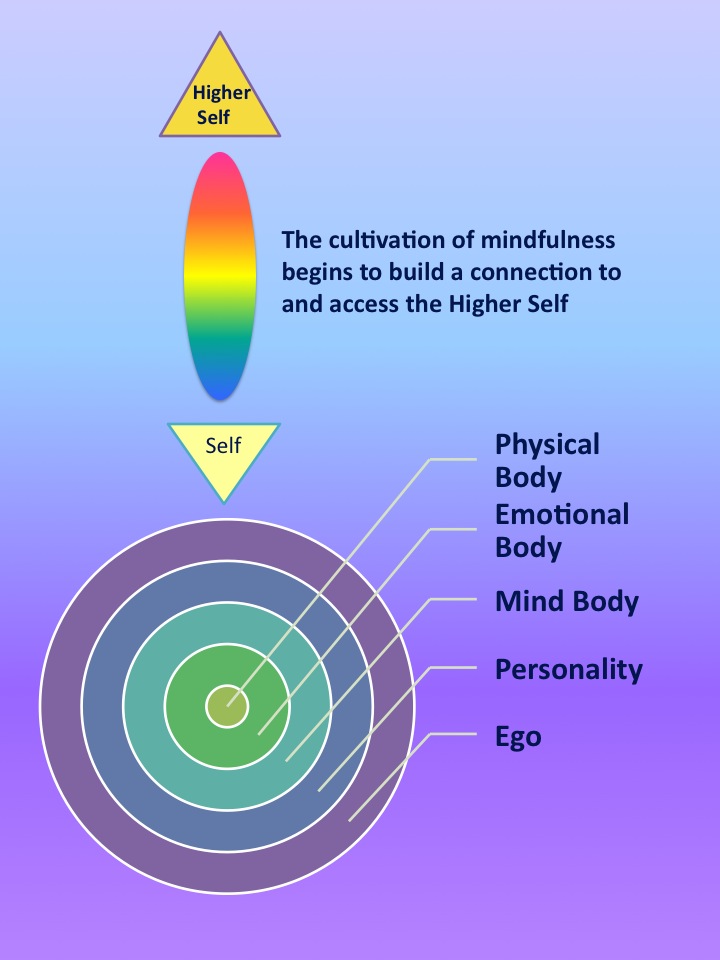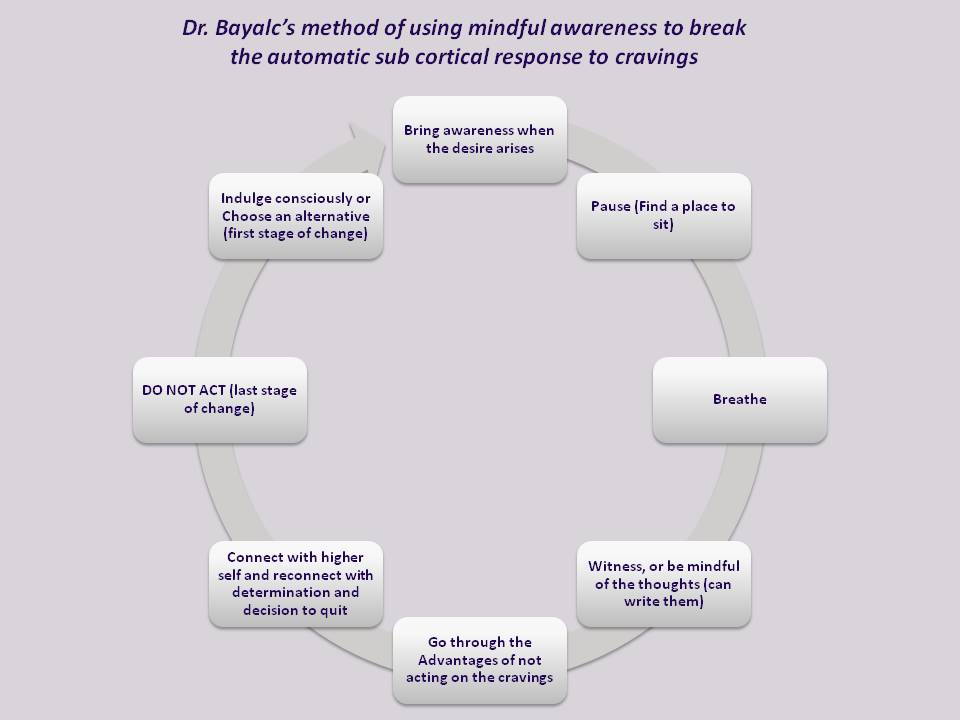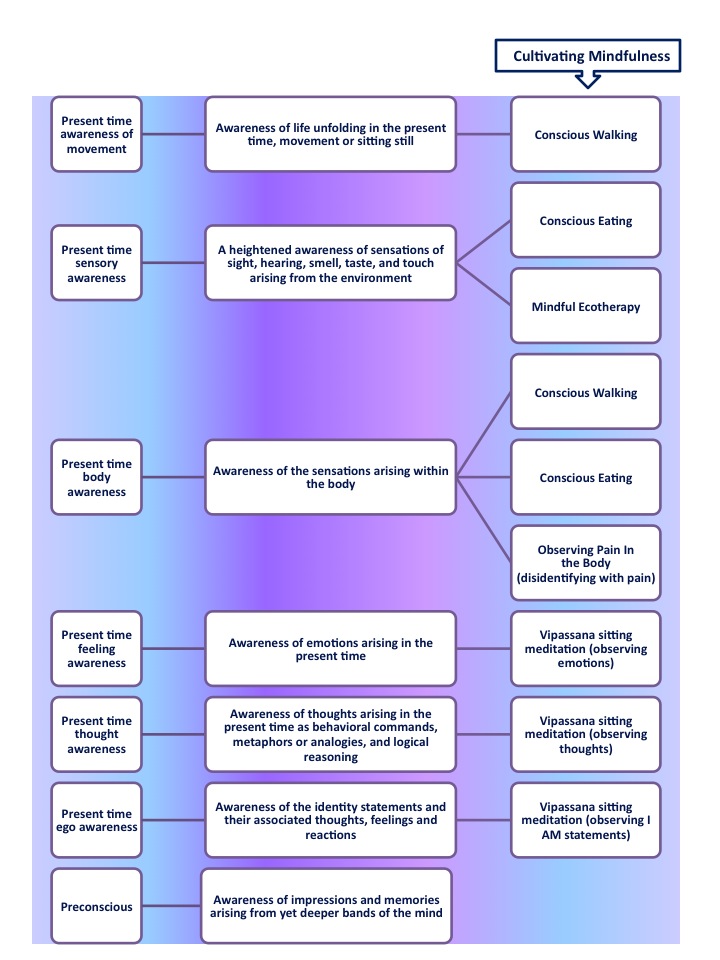The aim of mindfulness practice (shamatha) is to tame the mind.
At Hawaii Naturopathic Retreat we use mindfulness in the treatment of many mental and physical conditions. Mindfulness helps for stress management in the treatment of anxiety related conditions, such as addiction and eating disorders and depression. We find that the practice of mindfulness has a favorable effect on pain management, high blood pressure, heart disease, sleep, irritable bowel syndrome (IBS) and asthma.
Mindfulness is a powerful method to find true and permanent happiness. It bypasses the chatter of the mind that is our source of misery. Often the search for success and power is based on feelings of insecurity or low self-esteem. Success and power never quenches the thirst for success and power because success and power does not heal insecurity.
Fears and worries about the future and regrets over the past can eat away at us in the present moment and life is not lived and enjoyed because the mind is either in past (regret, sadness, blame, resentment) or anxious about the future (worry, fear). Mindfulness brings us to the present with full attention and in contact with our higher self and full potential.
What is Mindfulness?
Mindfulness is the conscious practice of a state of heightened awareness. It is derived from the Buddhist tradition of meditation. In this state of inner alertness the focused attention is able to recognize, identify, and label the contents arising at different levels of awareness. It is the art of being aware of sensations, emotions and thoughts arising in the present time. Mindfulness monitors the moment-to-moment present experience and detaches from it by turning our attention to a chosen purpose.
Mindfulness is the art of being present and responsible for our inner experience. It implies the choice of being on a spiritual path. Mindfulness brings about separation of the observer (the witness) from the contents of awareness (thoughts). It allows the individual to monitor her/his thoughts, emotions and sensations as they arise in the present time, rather than be victimized by them.
Mindfulness differs from meditation in that meditation is an acknowledgment of thoughts, sensation emotions and detachment from them by turning our attention away to a mantra or observation of the breathing instead of our purpose. Meditation and mindfulness share the same goal of freeing oneself from the mind’s thinking patterns and find inner peace. However, meditation is the practice of awareness for the sake of awareness whereas mindfulness has a purpose.
Mindfulness in Psychotherapy
In therapy mindfulness has demonstrated strength to empower the individual to cope with stress and dysphoric emotional states like discontentment, restlessness, dissatisfaction, malaise, depression, anxiety and indifference. It has shown to improve inner alertness and awareness of inner thoughts and feelings. In addition mindfulness facilitates the ability of the client to attend to inner process.
Mindfulness is practiced as a psychotherapy tool to free individuals from bad habits, negative thinking, impulsive behaviors, the mind (taming the mind), to be happier, to take responsibility for ourselves, for self- improvement and personal growth.
How Does Mindfulness Bring About Change in Psychotherapy?
Mindfulness brings about awareness of separation of the observer or seer (the witness, or the attention) from the contents of awareness (thoughts, emotions, sensations). It allows the individual to monitor these contents as they arise in the present time. This process may promote change in psychotherapy client or patient various ways. George Boyd identified the following ways in his book, Meditation for Therapy –
- It breaks up identification with symptoms. The meditator [individual] does not state, “I am depressed,” but instead, “I observe depressed or sad feelings arising in the present time.”
- It promotes awareness of life as an ever-changing process, which gives hope that dysphoric symptoms are not permanent.
- It may also promote a sense of efficacy, whereby the client gains the ability to focus attention and change how he or she experience pain or trauma.
- It can improve the client’s ability to become aware of intrapsychic content, which improves inner concentration (focus) and alertness (responsiveness).
- By allowing the client to experience a broader range of emotionality, mindfulness provides a template for empathy. By cultivating the capacity for empathy, it can evoke the client’s feelings of compassion for others who may be suffering similarly.
- It develops a tolerant and non-judgmental viewpoint that may collapse negative attitudes.
- It trains the client to be more skillful at entering the ASA (altered state of awareness) in which psychotherapeutic work is carried out.
Why Practice Mindfulness?
Mindfulness finds a very appropriate place in today’s extroverted and over-stimulated society that appeals to the illusory satisfaction of our desires. Mindfulness is used to filter these temptations and access the higher self and gain control over the inner world (emotional and mind bodies, ego and personality). Temptations may be drugs, alcohol, sex, food and can also be fame, money, power and success without a purpose.
At Hawaii Naturopathic Retreat Center we use mindfulness as a psychotherapy tool to access the soul. Mindfulness fulfills the deepest longing of every human being who wants to end personal suffering. We use mindfulness to help patients find a way out of the ‘trap’ they may find themselves in.
Aspects of Mindfulness:
- The practice of mindfulness is a valuable tool to bring about lifestyle changes for mental and physical conditions.
- It is also an invaluable tool in personal growth, to know oneself and keep progressing on the path of love and freedom.
- Mindfulness allows a peaceful feeling and a sense of power.
- Mindfulness switches perspective from past or future to the experience of now.
- Mindfulness facilitates switching the center of gravity from mind to the heart.
- Mindfulness enhances the pleasure of being alive and it is a powerful tool to happiness.

- Diagram illustrating the layers of the lower self that need quieting and taming to access the higher self.
Mindfulness and Purpose
The purpose of mindfulness is to be aware of the quality of our experience without judgment. Observation of present time thoughts, emotions and sensations arising are only for the purpose of knowing. It is not for judging as good or bad, but simply observing what is arising and labeling it without judgment.
At Hawaii Naturopathic Retreat we use mindfulness for the purpose of dismantling undesirable thought patterns and to create new patterns in line with a purpose that has been chosen by the patient. For instance, someone who wants to quit drinking and has been sober may have cravings and thoughts about having a glass of wine. Mindfulness is used as an antidote to impulsivity. It creates a space to examine and reevaluate the thought of drinking in the light of the chosen purpose to be sober. Or someone may be depressed and entertain suicidal thoughts. Being mindful of these thoughts and having made the choice to live, the person can chose consciously to focus on positive thoughts. Mindfulness is a psychological tool to be used to honor decisions made by the higher self.
In addiction mindfulness promotes understanding and compassion rather than judgment and conflict with the addicted self. Mindfulness allows the unconscious patterns to emerge to the conscious mind and provides the opportunity for the rational mind to evaluate thoughts and dis-identify from them. It can create a window where the witness has the power to make a conscious decision. It has been used efficiently to break the cycle of addiction and compulsive behavior.

Cultivating Mindfulness
Mindfulness must be cultivated through practice. Just like physical exercise conditions the body, spiritual exercise strengthens the soul. At Hawaii Naturopathic Retreat we incorporate various mindfulness practices into the daily routine of our programs to facilitate the practice of mindfulness.
The repetition of these practices makes mindfulness habitual for patients and empowers patients with a new way of being in the world and in relating to others.
Practices at Hawaii Naturopathic Retreat for Cultivating Mindfulness:
- Sitting Meditation (Vipassana), observing the occurrence of thoughts, sensations and feelings, letting them go and focusing on the breath
- Reichian Breathwork (individual sessions)
- Conscious Walking
- Conscious Eating
George Boyd, an expert meditation teacher and innovator in the field, identified seven bands or luminal states in which present time awareness of consciousness can be experienced. These seven bands are identified in the table below.
| Band | Boyd’s name for this state | Contents |
| 1 | Present time awareness of movement | Awareness of life unfolding in the present time, movement or sitting still |
| 2 | Present time sensory awareness | A heightened awareness of sensations of sight, hearing, smell, taste, and touch arising from the environment |
| 3 | Present time body awareness | Awareness of the sensations arising within the body |
| 4 | Present time feeling awareness | Awareness of emotions arising in the present time |
| 5 | Present time thought awareness | Awareness of thoughts arising in the present time as behavioral commands, metaphors or analogies, and logical reasoning |
| 6 | Present time ego awareness | Awareness of the identity statements and their associated thoughts, feelings and reactions |
| 7 | Preconscious | Awareness of impressions and memories arising from yet deeper bands of the mind |
The following diagram illustrates how mindfulness is cultivated at Hawaii Naturopathic Retreat by offering an exercise or practice for developing awareness at each of these seven bands.

- Cultivating Mindfulness at Hawaii Naturopathic Retreat
